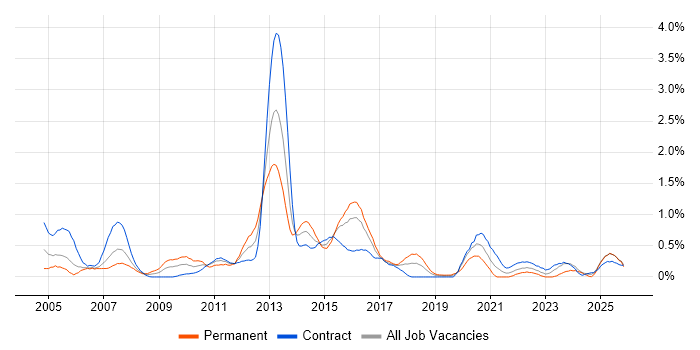Fixed Income
Scotland > Glasgow
The table below looks at the prevalence of the term Fixed Income in permanent job vacancies in Glasgow. Included is a benchmarking guide to the salaries offered in vacancies that cited Fixed Income over the 6 months leading up to 29 May 2025, comparing them to the same period in the previous two years.
| 6 months to 29 May 2025 |
Same period 2024 | Same period 2023 | |
|---|---|---|---|
| Rank | 61 | 230 | - |
| Rank change year-on-year | +169 | - | - |
| Permanent jobs citing Fixed Income | 3 | 7 | 0 |
| As % of all permanent jobs advertised in Glasgow | 0.57% | 0.17% | - |
| As % of the Miscellaneous category | 1.85% | 0.29% | - |
| Number of salaries quoted | 0 | 0 | 0 |
| Median annual salary (50th Percentile) | - | - | - |
| Scotland median annual salary | - | - | - |
All Generic Skills
Glasgow
Fixed Income falls under the General and Transferable Skills category. For comparison with the information above, the following table provides summary statistics for all permanent job vacancies requiring generic IT skills in Glasgow.
| Permanent vacancies with a requirement for generic IT skills | 162 | 2,429 | 684 |
| As % of all permanent jobs advertised in Glasgow | 30.80% | 60.65% | 45.00% |
| Number of salaries quoted | 80 | 302 | 216 |
| 10th Percentile | £35,000 | £31,375 | £35,733 |
| 25th Percentile | £46,563 | £40,000 | £43,750 |
| Median annual salary (50th Percentile) | £55,000 | £50,000 | £60,000 |
| Median % change year-on-year | +10.00% | -16.67% | +20.00% |
| 75th Percentile | £75,360 | £67,500 | £70,000 |
| 90th Percentile | £84,525 | £82,500 | £75,000 |
| Scotland median annual salary | £51,645 | £52,500 | £57,500 |
| % change year-on-year | -1.63% | -8.70% | +4.55% |
Fixed Income
Job Vacancy Trend in Glasgow
Job postings citing Fixed Income as a proportion of all IT jobs advertised in Glasgow.

Fixed Income
Salary Trend in Glasgow
3-month moving average salary quoted in jobs citing Fixed Income in Glasgow.
Fixed Income
Co-occurring Skills and Capabilities in Glasgow by Category
The follow tables expand on the table above by listing co-occurrences grouped by category. The same employment type, locality and period is covered with up to 20 co-occurrences shown in each of the following categories:
